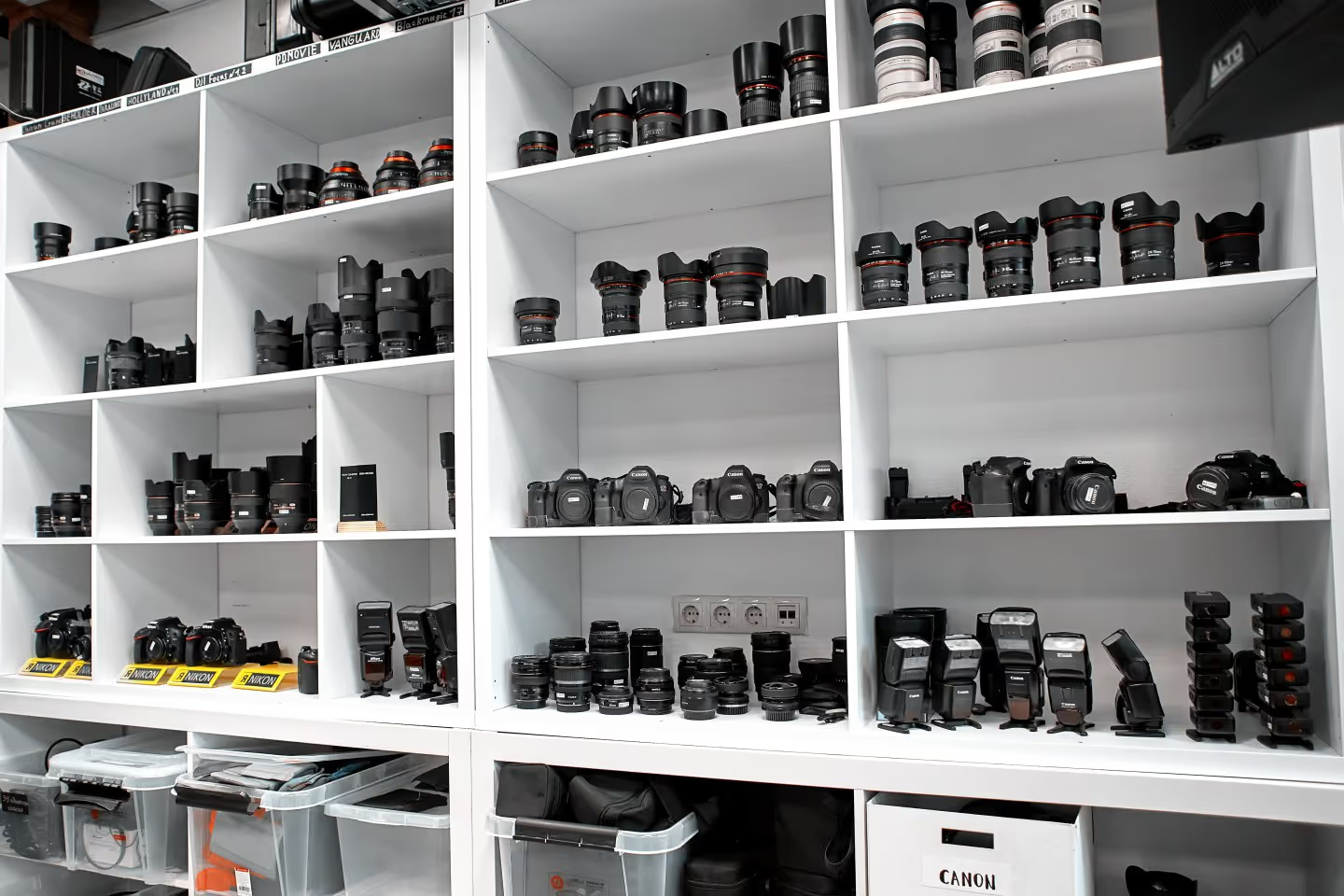Easy Equipment Rental

When it comes to tackling media production projects and operations, having the right tools on location is essential for your business. The easy rental industry offers a practical investment for obtaining the necessary new equipment tools without the commitment of purchasing them outright.
Whether you're embarking on a construction job for an event production, or simply require some extra equipment for a weekend project, a rental business can save you time and money. In this guide, we'll answer the common questions about how easy equipment rental works, its benefits, and purchase tips to ensure you make the most out of your rental experience.
1. Easy Equipment Rental
2. Finding the Right Rental Service
3. The Rental Process Explained
4. Tips for a Smooth Rental Experience
5. Conclusion
Easy Equipment Rental
Why Choose Equipment Rental?
Opting for easy rent comes with several advantages for your business. First, it eliminates the high upfront costs associated with purchasing new tools or products. This is particularly beneficial for individuals or businesses working within tight budgets. Additionally, easy rent offers flexibility. You can access a wide range of equipment tailored to specific tasks, ensuring you always have the best tool for the job and you can take on that last-minute opportunity.
There's also the convenience factor—renting often includes maintenance and support services, saving you from the hassle of repairs and upkeep. Lastly, renting equipment is an eco-friendly choice. It promotes resource sharing and reduces the need for new tools. In summary, easy equipment rental provides a cost-effective, flexible, and sustainable solution for all your project needs.
Benefits of Easy Equipment Rental
The benefits of easy equipment rental are numerous. One major advantage is cost savings. Renting instead of buying eliminates the need for large capital expenditures, freeing up funds for other project needs. Another benefit is using more up-to-date technology. Rental companies frequently update their inventory, ensuring you have access to the latest and most efficient tools. Furthermore, renting reduces storage issues.
Equipment can take up significant space, requiring you to find another place. Renting allows you to return items when not in use. This also alleviates the burden of maintenance, as rental companies typically handle repair and servicing. Additionally, renting equipment allows for greater project flexibility. You can easily switch out tools as project requirements change, ensuring you always have the right equipment for the job. All these factors make easy equipment rental a smart choice for any project.
Finding the Right Rental Service
Researching Rental Companies
When looking for an easy equipment rental business service, data and thorough research are key. Start by checking online reviews and ratings to gauge the reputation of various rental companies. Websites like Yelp, Google Reviews, and industry-specific forums can provide valuable insights from previous customers on what they love. Additionally, visit the company's website to verify their inventory and ensure they have the equipment you need.
It's also beneficial to compare rental rates and terms across different companies. Some may offer better deals or more flexible rental periods. Don’t forget to inquire about their expertise, maintenance, and support services; a reliable company should provide well-maintained equipment and prompt customer support. Lastly, seek recommendations from friends, family, or colleagues who have experience with equipment rentals. Personal testimonials can often lead you to trusted providers. By investing time in getting the right data and research, you can find a rental company that meets your needs and ensures a smooth rental experience. You'll be better covered.
Reading Reviews
Reading reviews is a key step in selecting the right easy equipment rental service. Customers provide firsthand accounts of other customers' experiences, helping you gauge the reliability and quality of the rental company. Look for consistent positive feedback regarding the condition of the equipment, the quality of customer service, and the overall rental experience. Pay attention to any recurring issues mentioned in negative reviews, as these can indicate potential problems.
Website Testimonials
Testimonials on the company’s website can also offer valuable insights, but keep in mind they may be handpicked to showcase the best experiences. For a more balanced view, consider reviews from independent platforms like Google Reviews or Trustpilot. Additionally, ask for references from the rental company and contact past clients directly if possible. By thoroughly reading testimonials, you can make an informed decision and choose a rental service that meets your expectations.
Comparing Costs
When selecting an easy equipment rental service, comparing costs and services is crucial. Start by obtaining quotes from multiple rental companies to understand the pricing landscape. Pay attention not only to the rental rates but also to any additional fees for delivery, setup, or maintenance. Some companies may offer package deals or discounts for long-term rentals, which could provide better value. Beyond pricing, evaluate the range of services each company offers.
Comparing Services
A comprehensive rental service should include well-maintained equipment, flexible rental periods, and responsive customer support. Consider the availability of extra services such as on-site assistance or equipment training. Weighing these factors will help determine which company offers the best overall serving. Remember, the cheapest option isn't always the best; it's important to find a balance between cost and quality of service. By carefully comparing services, you can ensure a smooth and cost-effective rental experience.
The Rental Process Explained
Booking Your Equipment Online
Booking your equipment online is a convenient and efficient way to secure the tools you need. Start by visiting the rental company’s website and browsing their inventory. Most websites will have detailed descriptions and specifications for each piece of equipment, helping you select the right tools for your project.
Once you’ve chosen the items, check their availability for your desired rental period. Many sites offer real-time availability updates, ensuring you can plan accordingly. Next, add the equipment to your cart and proceed to the checkout process. Here, you’ll enter your rental dates, delivery or pickup preferences, and payment information. Some companies may require a deposit or pre-authorization on your credit card.
Finally, review and confirm your booking. You should receive an email confirmation with the rental details and any further instructions. Booking your equipment online streamlines the rental process, saving you time and ensuring you have everything ready for your project.
Understanding Rental Agreements
Understanding rental agreements is a crucial part of the easy equipment rental process. A rental agreement outlines the terms and conditions of the equipment rental, protecting both you and the rental company. Start by reading the agreement thoroughly, and paying close attention to the rental period, rates, and any additional fees. Note the company's policies on equipment damage, late returns, and cancellations.
Some agreements may include clauses about insurance coverage, specifying who is responsible for any damages incurred during the rental period. It's also important to understand the maintenance and repair terms. Typically, the rental company is responsible for regular maintenance, but you might be liable for repairs due to misuse. If there are any unclear terms or conditions, don’t hesitate to ask the rental company for clarification. By fully understanding the rental agreement, you can avoid unexpected charges and ensure a smooth rental experience.
Pickup Procedures
Understanding the pickup and return procedures is essential for a hassle-free easy equipment rental experience. Typically, you have the option to either pick up the equipment yourself or arrange for delivery. If you choose to pick up, ensure you bring a valid ID and a copy of your rental agreement. Some companies may also require a credit card for any potential fees. During pickup, inspect the equipment to confirm it is in good working condition.
Return Procedures
For returns, make sure to adhere to the agreed-upon return time to avoid late fees. If the equipment was delivered, reach out to the rental company for a convenient pickup time. Clean the equipment and address any minor maintenance issues before returning it. Some companies may perform an inspection upon return, so be prepared for that. By following the specified return procedures, you can ensure a smooth and efficient rental process putting your mind at ease.
Tips for a Smooth Rental Experience
Inspecting Equipment Before Use
Inspecting equipment before use is vital to ensure safety and functionality. Start by examining the exterior for any visible damage or wear. Look for cracks, rust, or missing parts that could affect performance. Next, test the equipment to verify it is in proper working order. For powered tools, check the engine, battery, or electrical connections. Make sure all controls and safety features are operational.
If you’re unfamiliar with the equipment, ask the rental company for a demonstration or instructional manual. Document any pre-existing issues with photos and report them to the rental company immediately to avoid liability. Additionally, ensure you have the necessary safety gear, such as gloves, goggles, or ear protection, before starting your project. By thoroughly inspecting the equipment before use, you can prevent accidents, ensure efficient operation, and avoid potential disputes with the rental company over damages.
To avoid unexpected issues and ensure every item is rental-ready, download our free AV equipment inspection checklist designed for pre- and post-rental checks.
Communicating with Rental Providers
Effective communication with rental providers is key to a smooth easy equipment rental experience. Start by clearly outlining your project needs when discussing your rental. Provide specific details such as the type of equipment required, the duration of the rental, and any special considerations. This helps the rental company recommend the best tools for your job.
During the rental period, maintain the lines of communication. If you encounter any issues or have questions about the equipment, don't hesitate to contact the provider. Promptly report any malfunctions or damages to avoid misunderstandings. Also, discuss the rental company's policies on extensions if you think you might need the equipment for longer than initially planned. Clear communication ensures that both parties are on the same page, reducing the likelihood of problems. By staying in touch with your rental provider, you can address any concerns quickly and ensure a successful rental experience.
Handling Unexpected Issues
Handling unexpected issues promptly and efficiently is crucial during an easy equipment rental. First, familiarize yourself with the rental company's policy on equipment failures and emergencies before starting your project. If an issue arises, such as a malfunction or breakdown, contact the rental provider immediately. Most companies offer customer support to address such problems and may provide a replacement or repair service. Document the issue with photos or videos to provide clear evidence of the problem.
It's also wise to have a backup plan in place, particularly for critical projects. This might involve having alternative tools or knowing where to obtain additional equipment quickly. If the issue is user-related, consult the equipment manual or seek advice from the provider to resolve it safely. By staying prepared and maintaining open communication with the rental company, you can effectively manage unexpected issues and minimize disruptions to your project.
Conclusion
Recap of Key Points
In summary, easy equipment rental offers a practical and cost-effective solution for obtaining the tools you need for various projects to grow your business. Key benefits include significant cost savings, the latest technology, and eliminating storage and maintenance problems. When finding the right rental service, thorough research, reading reviews, and comparing costs and services are essential steps.
The rental process involves booking your equipment online, understanding rental agreements, and following proper pickup and return procedures. To ensure a smooth rental experience, inspect the equipment before use, maintain clear communication with rental providers, and be prepared to handle unexpected issues promptly. By following these guidelines, you can maximize the benefits of equipment rental and ensure your projects are completed efficiently and effectively.
Final Thoughts on Equipment Rental
Equipment rental makes for an excellent option for both individuals and businesses. It offers flexibility, cost savings, and a wide range of tools and machinery without the financial burden of ownership. By renting, you can always have the right equipment for each specific task, ensuring efficiency and quality in your work. It's also a more sustainable choice, promoting the reuse of resources and reducing the environmental impact of manufacturing new tools.
However, successful equipment rental involves careful planning and communication. Research rental companies, understand the terms of rental agreements, and maintain clear communication with providers. Always inspect equipment before use and be prepared for any unexpected issues. By taking these steps, you can make the most out of your rental experience and complete your projects effectively. Embracing easy equipment rental can be a game-changer, making your tasks more manageable and cost-effective.
Encouraging Practical Use
Practical use of rented equipment can significantly enhance project outcomes. Before renting, clearly define the scope and requirements of your project to ensure you choose the right tools. Make use of any instructional materials or demonstrations provided by the rental company to familiarize yourself with the equipment. This can prevent misuse and potential damage. Always follow safety guidelines and wear appropriate protective gear to minimize risks.
Additionally, plan your project timeline to make the most efficient use of the rental period, reducing downtime and avoiding unnecessary extension fees. If you’re unsure how to operate or maintain the equipment, don't hesitate to share your questions and seek advice from the rental provider. By taking a practical approach, you can maximize the benefits of your rental, ensuring that your projects are completed efficiently, safely, and within budget. Embracing these practices will help you make the most out of easy equipment rental.



